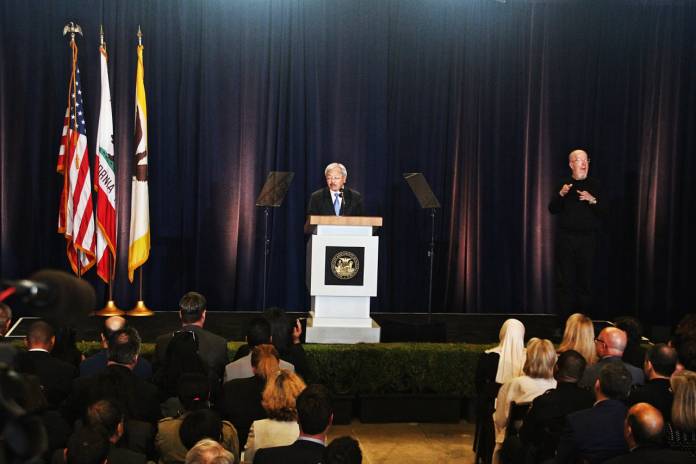
An upbeat Mayor Ed Lee delivered a State of the City address at the old Hibernia Bank Building today that sounded like a re-election speech, loaded with a list of a his achievements – some of them a bit dubious – and giving only a modest nod to the all-out attack that San Francisco can expect from the Trump Administration.
“The state of our city is ready,” he said. “Ready to finish implementing solutions on housing, homelessness, and police reform. Ready to defend ourselves against cynical attacks from Washington, DC.”
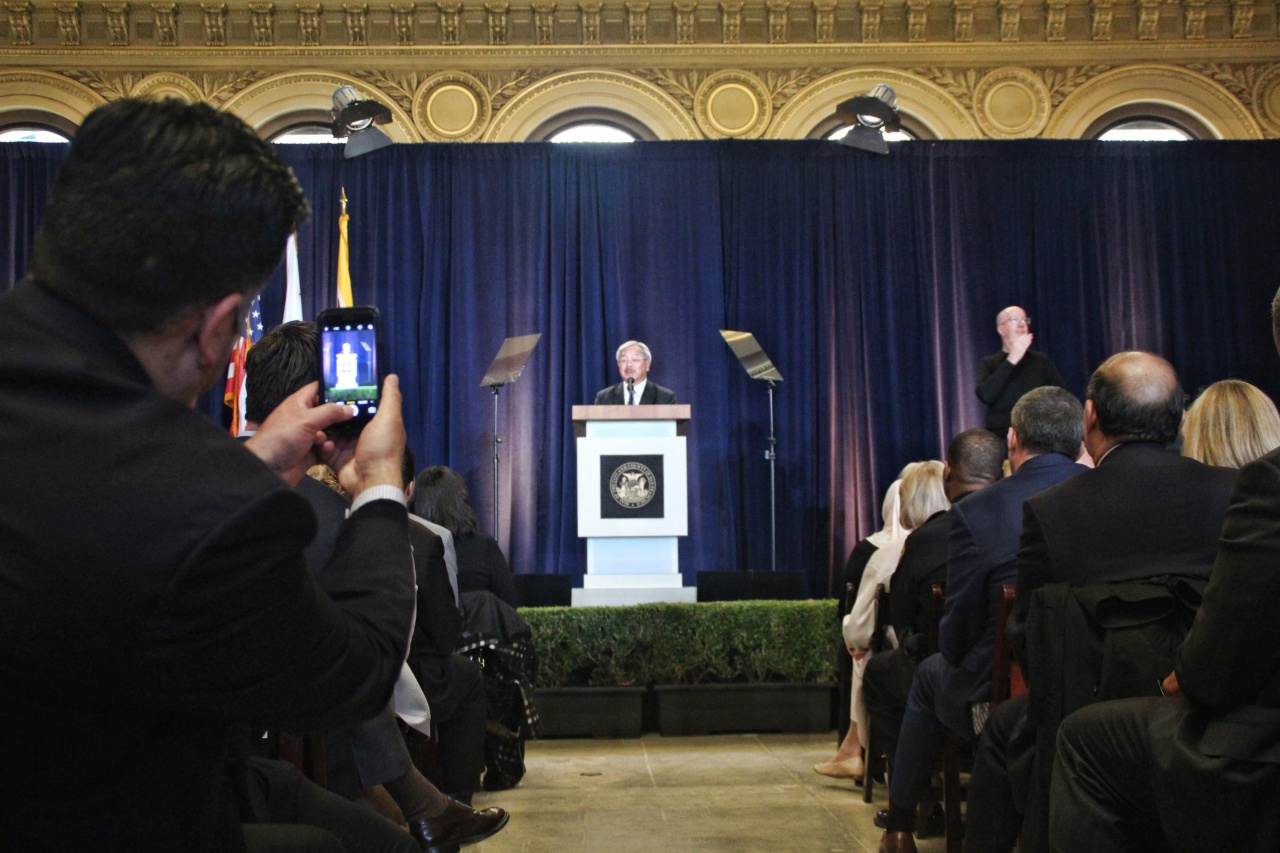
He got a long, enthusiastic standing ovation when he said that San Francisco is, and will remain, a sanctuary city.
But he never once mentioned that the new president has threatened to cut off what will be at least tens of millions and perhaps hundreds of millions in city funding or described how he might ask the residents and business community to come together to respond.
There was an air of unreality about the who thing: A mayor who has overseen the worst housing affordability crisis in the post-War era bragging, to applause, about his affordable housing policy. A room full of people who seemed to take the GOP dominance of the federal government as an afterthought. A lot of promises about “fighting” for San Francisco values, but not any real new policy ideas that would address the fact that this city is going to be increasingly on its own without Washington or Sacramento help.
A truly astonishing statement that “building more housing does help more people afford San Francisco.”
We spoke briefly with London Breed, president of the Board of Supes, before the speech and asked her about the prospect of hundreds of millions in lost revenue. “I’m not afraid,” she said. “We will deal with it.”
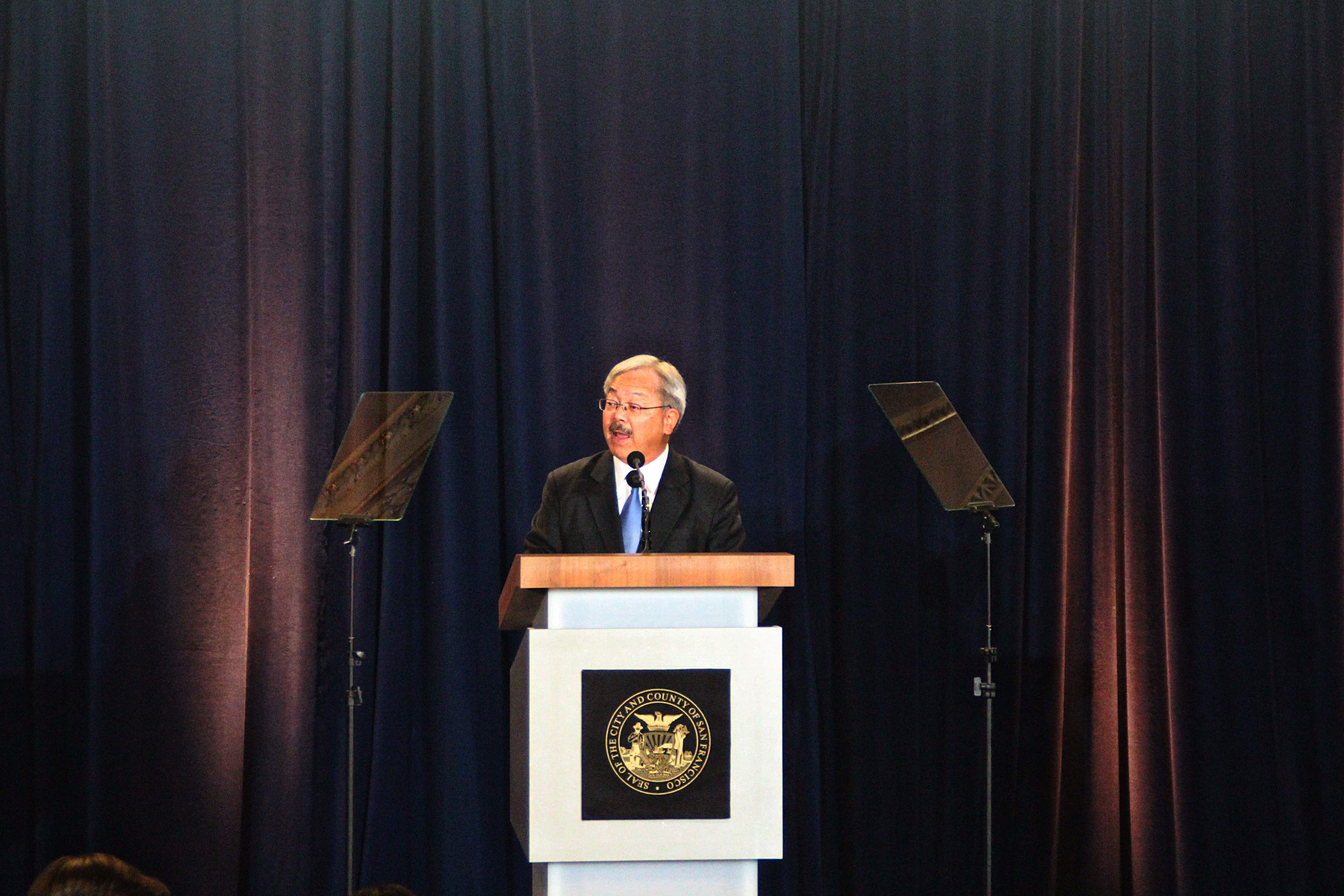
After the speech, we ran into Jim Lazarus, vice president of the Chamber of Commerce, who was almost giddy in his praise of the mayor. “We’ve gone from 10 percent unemployment to 2.9 percent,” he said. “San Franciscans are getting jobs.”
Lee talked up his employment record, too – without mentioning that housing prices have gone up so much faster than salaries (and many of the jobs are in low-paid service areas) that only a tiny fraction of local workers can afford the median-priced home or median rent. There has been a huge outmigration of the middle-class workforce.
But back to the Chamber: We asked Lazarus what the business folks he represents would do if Trump cut, say, $300 million in federal funding for the city. “We will fight back in Washington,” he said. “We still have a very senior senator there.”
Yes: Dianne Feinstein, who Lazarus used to work for, is still in Washington. But the Republicans – conservative Republicans – control both houses and will be able to implement any kind of budget they want. But Lazarus said he wasn’t worried yet.
“Let’s see how manageable the problem is,” he told us.
We pressed on: What if it isn’t manageable? What if we are facing serious service cuts? Would the business community support new revenue measures?
“Well,” he said, “we can’t deal totally from local revenue.”
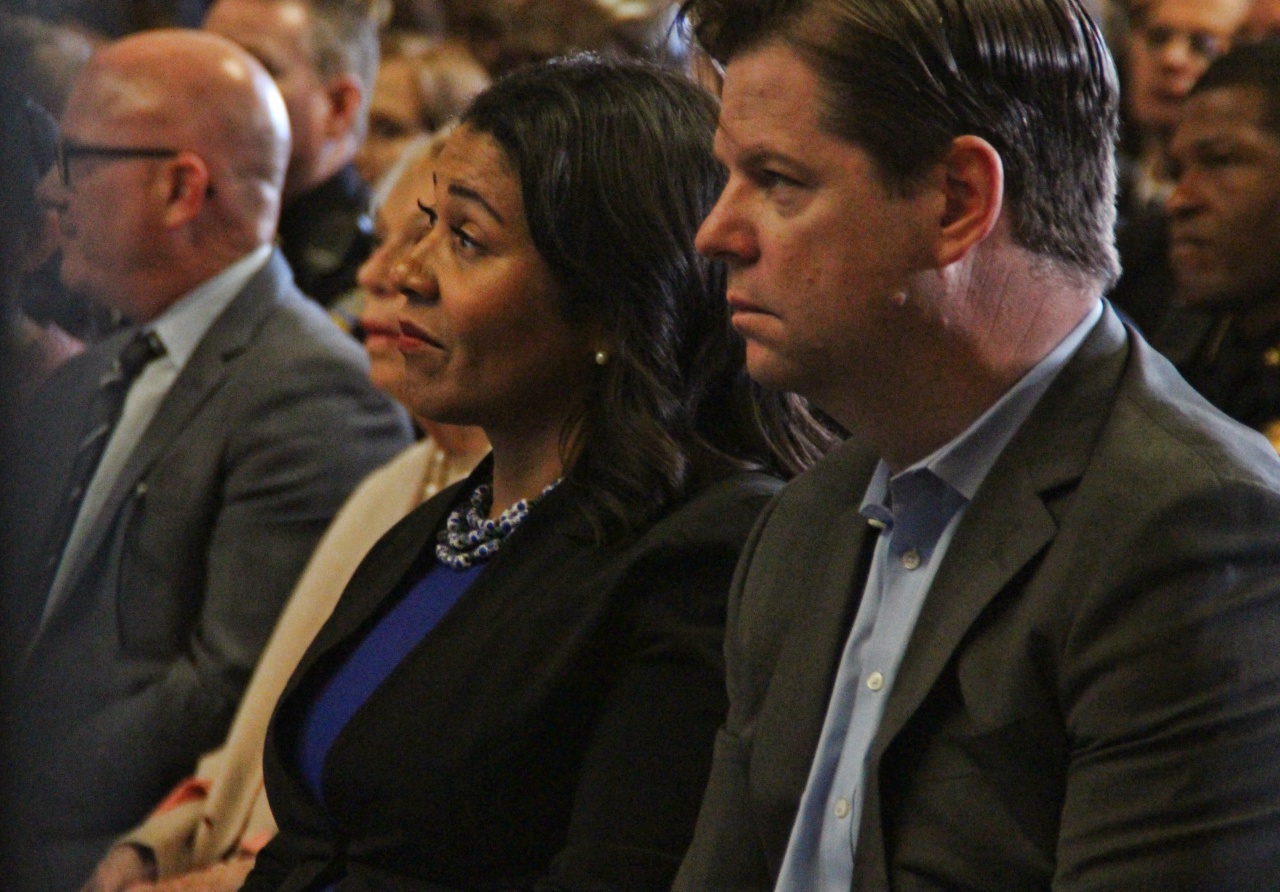
City Attorney Dennis Herrera says the city is prepared to go to court if Trump tries to follow through on his Sanctuary City threats; at least somebody in town is actually prepared to do something. But if Paul Ryan just reduces federal money for cities radically in the Congressional budget, we can’t sue over that.
Jeff Kositsky, the head of the mayor’s homeless department, told us that, in the worst case, homeless services alone could lose $30 to $60 million. That’s one department. This is serious – it’s bizarre that the mayor isn’t talking about it.
Should we wait and see “how manageable” this is? Should we also wait and see if we can “manage” climate change? Nice to know that Sup. Breed is so confident, but this is scary shit. And if we are going to fight back, we need to be getting our act together, now.
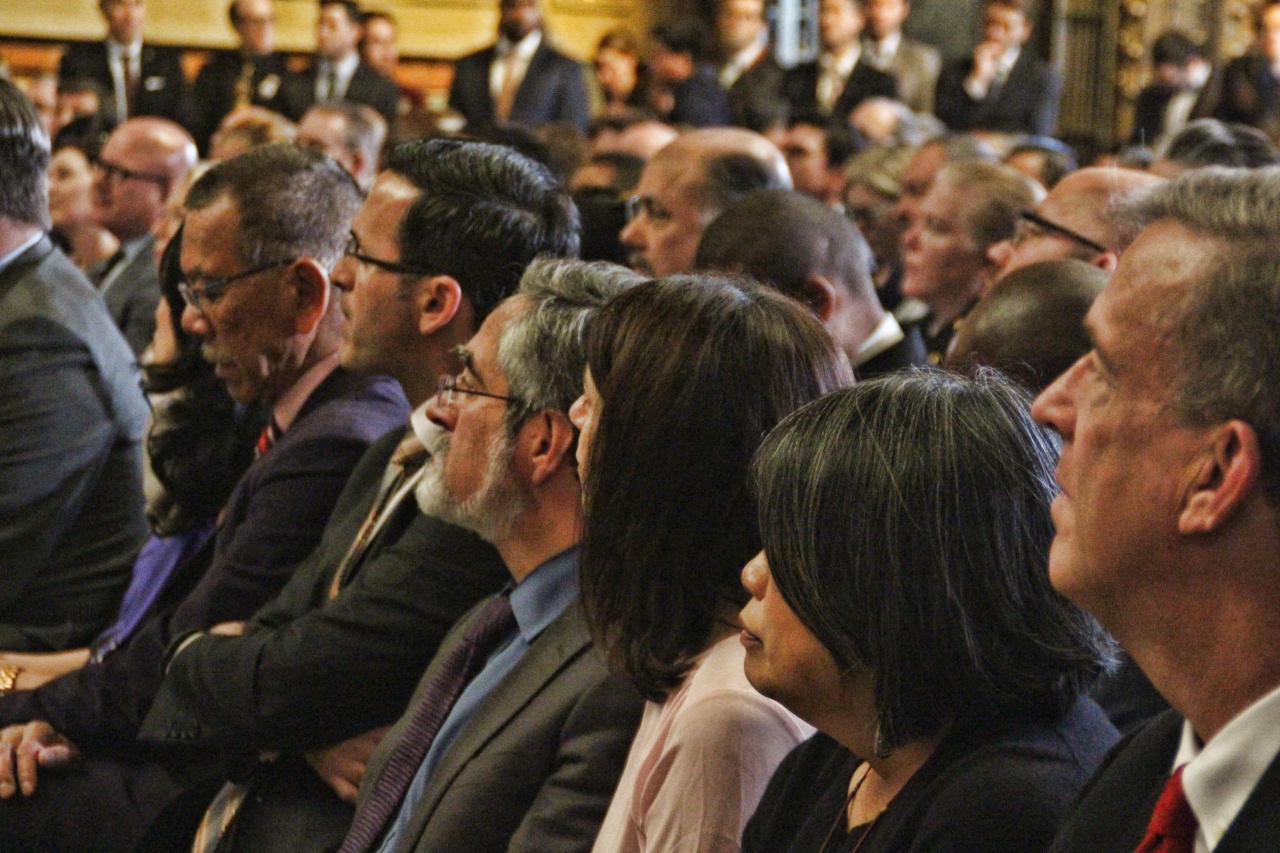
“When I took office,” the mayor said, “San Francisco was experiencing a housing crisis. Long-time San Franciscans were struggling to afford homes due to the failure to build enough housing throughout the 90s and 2000s, and a surge in economic growth that put upward pressure on housing prices.
“So we went to work. Reinvesting in affordable housing at all levels, from public housing to low-income and working class.”
There’s no question that public housing is being rebuilt. The disaster of the San Francisco Housing Authority is no longer managing all of the projects; much has been turned over to private nonprofits. We don’t know the long-term results of this experiment; we do know that the old system was a train wreck, and the nonprofits, which have a track record of success in managing affordable housing, are now rebuilding and restoring decrepit units.
But overall, in the private housing market, the crisis is worse than it was when Lee took office.
The unemployment rate may be down, but the income and wealth gap in the city has driven thousands of longtime residents out of town.

More unreality: Why did we underbuild housing in the 1990s and 2000s? And why will building more housing in the private market not make things more affordable for the working class?
Because cities don’t build a lot of housing (we should). Most of it these days is built by private investors who are looking for the highest rate of return on their money. In the 1990s, commercial office projects returned more than housing in SF, so that’s what got built. Now, luxury condos have the highest return, so that’s what most developers want to build.
It’s not as if we can magically convince international speculative capital to accept lower returns and build middle-class rental housing in San Francisco. We can force the high-end builders to include more affordable housing, or we can shift away from the private market as the primary source of housing. But we can’t pretend we live in a world where wishing for affordable housing from the private market will work.


Oh, and if we just got rid of all the rules and let the developers build say 200,000 more housing units in the city? At a certain point, if the housing market fell to the point where most of the people who work in the city could afford to buy or rent a new place, the profit level – the return on investment – would drop to the point where developers could make more money going somewhere else.
(And who would pay for the infrastructure we need to support that many more people? Under our current rules, the developers wouldn’t.)
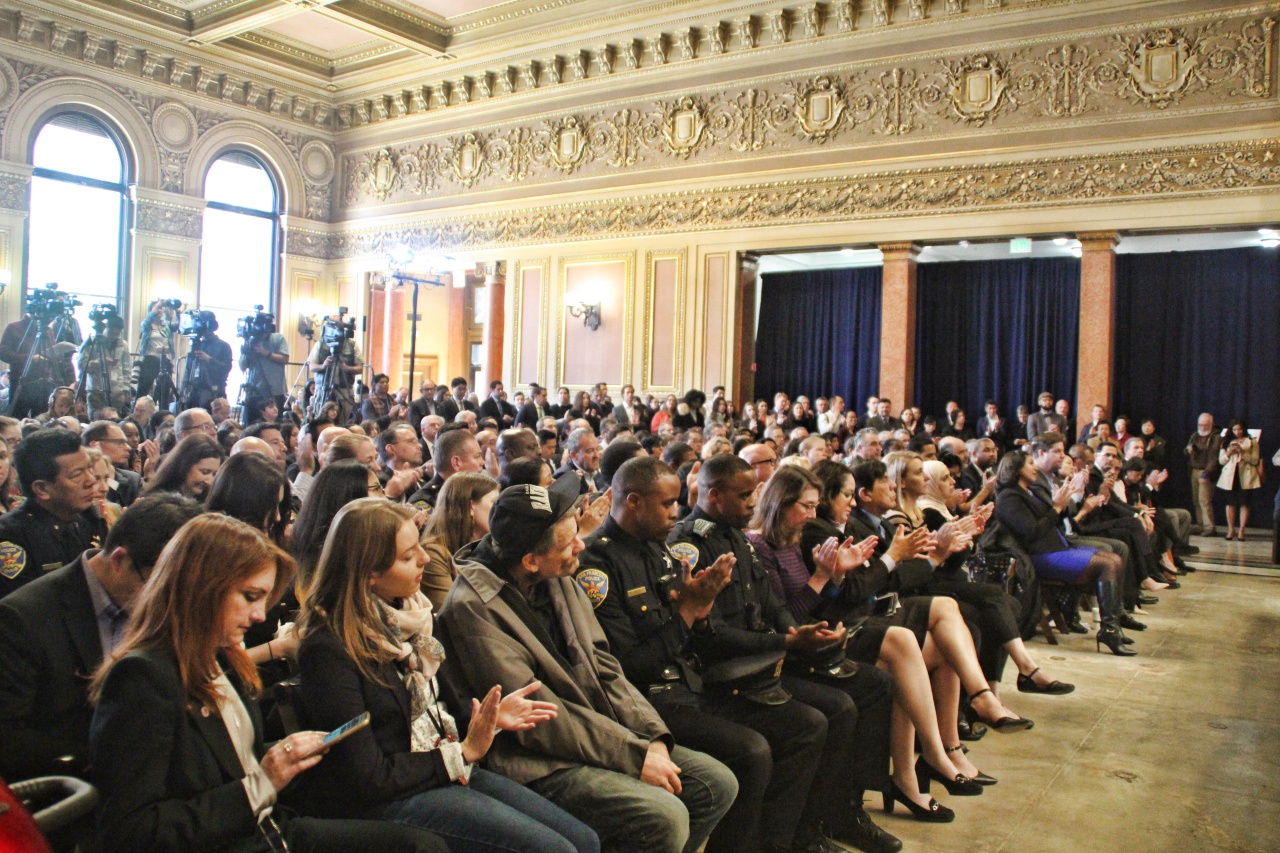
Why did the housing crisis get so bad under Mayor Lee? One reason is that he actively courted tech companies to come to the city, bringing in high-paid workers who wanted to live in “cool” places like the Mission. Then he allowed tech companies to bring shuttle buses into town to take more high-paid workers from those cool neighborhoods to jobs on the Peninsula, where cities get away with building no housing by exporting their problem to San Francisco.
That’s reality. It’s not what we heard at the Hibernia Bank Building today.



City workers have defined-benefit pension plans (w/guaranteed returns, no matter what the stock market does) that will bankrupt San Francisco eventually unless their are reform measures.
“Sups. Jeff Sheehy, Sandra Lee Fewer, Hillary Ronen Ahsha Safai listen
to the Mayor’s state of the city address. Photo by Sana Saleem.”
Aaron Peskin, etc.? 🙁
I don’t think the percent of foreign investment has changed much in 40 years, only the nations have changed. Most of that is high end properties, not Hayes Valley or Civic Center. And what measurements are there to say foreign owned properties are not occupied.
How is it a boiling point crisis? By what measurement. If you can’t afford to live in the City it may be your personal crisis but how will that harm anyone else? A crisis would be ruining our quality of life with over-development.
The only advantage of ownership is security. The rising prices are not important. Tim can’t benefit much unless he moves out of the City. And then he probably wouldn’t care if the City become overdeveloped.
More Kraus crap. “the collective failed housing policies of these past 4 decades.” Obviously, Kraus has the magic crystal ball. There are a myriad of different cities and different housing approaches all over the Bay Area, and the overall economy has been through many cycles of up and down over these 4 decades in which Kraus pronounces everyone failing. Ah, hindsight and blame attribution… always a prime component of Kraus & gang. Spout your crap ad infinitum, but the overall market dictates these things.
Let’s all be sure to kneel at the free market altar. It works for a few and leaves many more behind so it must be a good system. Even Airbnb is learning that sane thinking folks aren’t too keen on an unregulated free market. How much money is enough? At what point do billionaires say to the mirror ‘do I need that 50th billion and start doing something seriously worthwhile instead of jamming Farmville down our throats or making more security riddled phones, or building a pipeline under sacred land, or even building another luxury high rise. You’re a 4 generation fool.
The market? The unfettered free market and it’s boring down to by great humanitarian such as yourself is a great problem that will someday bring this nation to its knees. When those it has not only left behind but gone out of its way to damage, come back to slit the throats of those of us that helped it along or, did nothing. That’s the intelligent design I’m concerned with. The growing gap between the have’s and the have not’s is not because of laziness or whatever the right wing finger point du jour is, it was designed that way and our troubles in the city reflect that ongoing perpetuation. It’s the same thing with oil, tech, human trafficking, banking and so on- how can we separate the 99% from their money? The amazing thing here is that while some may think their wealthy enough to be immune to this, you’re not. With no power and not enough money to effect real change, your throat gets cut just the same. That’s the free market of the future, your god. But it won’t happen too soon, you’ll be worm food as will I but on my monument (there will be none) it won’t read “here lies a 4th generation fool, great humanitarian” nobodys impressed.
FYI, the 8-15K number is a total fabrication.
In 2015 the city’s Legislative Budget Analyst said that their primary scenario was that 1,251 units had been removed from the rental market because of Airbnb. This is on page 3 of this report:
http://sfbos.org/sites/default/files/FileCenter/Documents/52601-BLA.ShortTermRentals.051315.pdf
Then they followed up in 2016 with a summary of all estimates of total listings of entire units, which center on the 3K level. This is on page 29 of this report:
http://sfbos.org/sites/default/files/FileCenter/Documents/55575-BLA.ShortTermRentals%20040716.pdf
I’m not saying that Airbnb isn’t a factor that we should continue to deal with, I’m just pointing out that progressives fabricate numbers to make it look like a much bigger factor than it is.
In general, if a progressive makes a wild claim without offering any attribution they most likely made it up.
If the market was deciding, everything would be “overbuilt”, there would be zero incentive to underbuild….
Have you read about Vancouver’s approach to cooking their insane property market? Interesting things we could apply here like:
Vacancy tax
Foreign investor tax
Higher levels of scrutiny around money laundering
So what is the fix?
The elephant in the room once again are the 8000 to 15,000 former rental units that, thanks to RonConway, Ed Lee, David Chiu, Scott Weiner and London Breed are now Airbnb’d without a central registry. Airbnb is a HUGE contributor to illegal evictions, displacement and San Francisco’s housing crisis.
Ah, yes, the crime rate and all evil for that matter will practically disappear if we round ’em up. Let’s send persecuted refugees back to their deaths like we did in 1939. Let’s give up all those taxes that help make California the sixth largest economy. And let’s continue to scapegoat foreigners for the failings of our own system.
Illegal immigration into California had flattened out, but, thanks to big-government Trump, it’s an all-consuming outrage to keep the reactionaries frothing and distracted.
Let the market decide & do not overbuild are partners. You’re just upset Jeremy because you are going to have to move.
They are partially full because investors, mostly from out of town or out of the country, buy them as a safe place to park money. Housing has become such a commodity that it’s no longer actually housing, it’s just an investment strategy
“let the market decide” “do not overbuild SF”, wow, that is some cognitive dissonance there. The market is trying to decide, the city government is very literally restricting the housing market, that is why we’re in the housing crises.
As far as housing goes, let the market decide, do not overbuild SF!
As far as this city losing Fed $, good, Kate Steinle’s death, the Bologna Family’s deaths mattered. Stop sanctuary cities!
hope you can as well
exactly the wrong recourse: penalizing public workers for the mismanagement of the City done by the Mayor – it’s an old trick – it’s wrong it’s divisive and sad that some people are going along with it – a city worker is not the problem for budget shortfalls
If we need to keep building market rate housing then why are so many of the brand new developments in Hayes Valley, Civic Center and Market Street still only partially full one to two years after their completion? San Francisco must build housing that is truly affordable for those making $100k or less. Market rate is luxury and many San Franciscans cannot afford to buy or rent these new properties. Also: how can we build on steroids when our roads are potholed, crumbling and clogged–the worst and most dangerous in the nation. San Francisco’s infrastructure, power, gas,water and sewer lines are maxed out and ancient. Our public transportation system is packed to maximum capacity and dysfunctional. Building more dense market rate development is irresponsible and foolish–it puts the cart before the horse. The many “For Rent” “For Sale” and “Available” signs reveal that there is a glut of market rate/luxury housing. This is what happens when your mayor and a number of supervisors are owned by developers and realtors.
SF and the Bay Area have been under-building the necessary amounts of housing for over 40+ years.
This chronic housing shortage is due to the collective failed housing policies of these past 4 decades.
Accordingly, due to these anti-housing-development policies, housing costs have been outpacing income for 40+ years.
Year in and year out, housing prices have continually increased to the present — where were now at a “boiling point”, i.e. a housing crisis.
Lee has been Mayor since 2011 (i.e., 6 years), you can’t blame the housing crisis on him alone.
In this respect, it has truly been a “group effort” and we, i.e., the electorate, are to blame since we voted in the politicians that set policy — and that policy has been consistently “anti-housing”.
And Tim continues to advocate for the same misguided policies, e.g. more reviews, more studies, more fees, more subsidies, more hearings, more neighborhood input, more mob-ocracy, more NIMBYism, ad nauseam, that makes housing ever more time-consuming, expensive and uncertain to produce.
Basically disincentivizing and penalizing, rather than encouraging massive housing production — as we should be doing.
But, hey, Tim’s a homeowner in Bernal — and his place is worth well over $1M, its no skin off his back.
Saying that the Mayor has overseen (managed) housing affordability may not be accurate. According to the State, Alameda, Santa Clara and Contra Costa counties are in the top 10 counties with a “crisis.” San Francisco is not in the top 10. There is not much the Mayor can do about it. Even if stops the development of any new office buildings, he can’t control what other counties or cities do. Nor can he stop businesses with middleclass jobs from leaving the City that middleclass workers follow. Those jobs have been replaced by upper middleclass jobs. However, one possible benefit of gentrification is the creation of those “low-paid” service jobs.
The faction of local workers who can afford the rent is higher than most other Bay Area cities. A larger percent of workers in other Bay Area cities commute. And many of thees cities have more housing than workers. Building more housing would not necessarily mean more (a higher percents) SF workers would live in SF.
“There was an air of unreality about the who thing”
Pull it together Tim.
I was hoping Lee would address the huge public-sector pension liabilities and pension reform. But I was only dreaming.